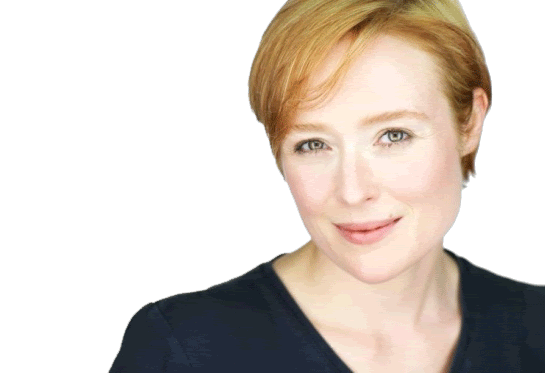He’s never before worked with Jennifer Ehle [E-lee]. “I’ve seen a lot she’s done; I’ve always admired her from afar.”
Ehle, last seen as another independent and contradictory woman in The Real Thing, seems ideally cast as the woman who declares "I shouldn't feel cozy married; it doesn't fit my principles" but who nevertheless ends up marrying Ernest, a successful and quite conventional art dealer (a character who, thanks to John Cunningham's excellent performance, is extremely likeable). But while Ehle delivers her lines with fine precision and looks smashing whether wearing a slip or one of several gorgeous silk kimonos, she's more moody than madcap, one reason that the evening's two and a half hours induce as many yawns as appreciative laughs.
...you can admire Jennifer Ehle's intensity and beauty, while trying to guess what role she thinks she's playing (Andromache? Cordelia? Amanda?) instead of Gilda.
Jennifer Ehle as Gilda is just like the girl next door. She is too ordinary, even though obviously neurotic, to have such sway over these two men. She has not got the delivery, the tone, the sophistication, the mystery and the allure such a woman must have, if we are to believe the plot. She is badly costumed with awful gray clothes which emphasize her bust (too large for the stage) and underscores her colorless, almost lifeless performance. She throws away her lines most of the time, and often she is barely audible. Gilda should be more of a Garbo type, an inscrutable woman, an enigma, a compelling, but not obvious sexual creature capable of winning any man, and holding her own in a world of painters and writers. None of this is evident in Ms. Ehle's performance.
Jennifer Ehle, despite an unflattering period hairdo, and Dominic West, perhaps a trifle too callow, struggle valiantly but keep foundering on Alan Cumming.
Jennifer Ehle, who was so good as Annie in "The Real Thing" and on screen in the film "Sunshine," is disappointingly flat as Gilda. It is impossible to imagine her as the daring woman in the play.
With this play in particular, the casting of the three main characters really dictates the tone of the production. It lives and dies by how sensational they are and what their chemistry is on stage. We were really lucky to have Alan Cumming on board right from the beginning. And then it was just a question of finding the right people to go with him. When you see Jennifer Ehle, Dominic West and Alan together, there is something sort of contemporary and fresh about the play because of who they are.
I'm not sufficiently familiar with ‘Design for Living’ to know where the script stops and the interpretation begins, but I’m pretty sure that Gilda needn’t be played as gravely as Jennifer Ehle plays her. The seriousness of this performance has all the signs of a well thought-out miscalculation, an attempt to do something with the role that, while interesting so far as the role itself goes, can’t be made to fit with the rest of the play. When the curtain goes up, Gilda is seen sitting in a slip in front of a whirring fan, lost in thoughts that, even if they’re happy (we’ll find that she’s just made love) are far from light. As if oppressed by an existential burden, Ehle holds the pose for about twice as long as an actress untutored by director Joe Mantello would, pushing the audience into wondering if something’s the matter with her – Ehle, not Gilda – and perhaps even drumming its fingers with impatience, lest we be in for an evening of Tennessee Williams. Ehle has a rich low voice, which she puts at the service of interpretive complexity: her simplest ‘no’ suggests hours of knotty deliberation, but for all that it’s unlikely to be a final answer.
WHO'S MISSING [from the "Best Performance by a Leading Actress in a Play" category] Jennifer Ehle. She charmed us—even in a misguided Design for Living.
Contrapunctually, Jennifer Ehle as Gilda rushes her lines, and might benefit from ordering her cappuccinos decaf from now on.
PS. Thanks to Chelsea for holding the fort this past week!




No comments:
Post a Comment